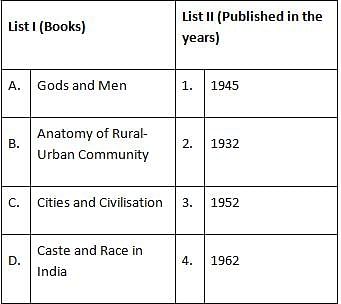UGC NET Paper 2 Sociology Mock Test - 10 - UGC NET MCQ
30 Questions MCQ Test UGC NET Mock Test Series 2024 - UGC NET Paper 2 Sociology Mock Test - 10
The statement there are some people who are more able than others may be attributed to?
Which one among the following is not consistent with Weber’s characterization of charismatic leadership?
| 1 Crore+ students have signed up on EduRev. Have you? Download the App |
According to Marx, the capitalist gets more than his due share mainly because of what?
Assertion (A): It is not merely equality under the law that determines that status of women in society.
Reason (R): Tradition and customs are involved in everyday social interaction.
Select the correct answer using codes given below:
_______ is an electrically powered and Remotely Operated Vehicle by DRDO.
Which factor is negatively correlated with modernization?
Observation method of data collection is used when researcher wants to determine:
Which one of the following statements is true regarding the different aspects of 'Multiculturalism'?
I. Cosmopolitan Multiculturalism reflects the influence of globalization on culture.
II. Pluralism multiculturalism supports toleration i.e. willingness to accept those views with which it disagrees
III. Liberal Multiculturalism recognizes various values and believes in respecting them all
'The tribal communities were originally separated from one another, subject to unequal pressure of the Hindu social and economic system. This had been given rise to':
Which one of the following is the appropriate for the above statement?
Who among the following is related with Transactional Theory of Leadership?
A. Max Weber
B. Bernard M. Bass
C. Robert R. Blake
D. Abraham Maslow
As pointed by Lowie who among the following, held property on a feudal basis:
Which of the following is true of institution but not of community?
Who has stated that the history of society is the history of the class struggle?
“The problems which scientists selected for study, and their conceptualization, were determined by the values of the scientists.” According to Max Weber, this statement refers to:
What do you mean by Gross National Product?
A major criticism of interest groups is that they
Which one of the following does not fall into the sociological understanding of status?
The term 'collective consumption' (Castells 1977) refer to-
Which of the following statements on the nature of the social role is not correct?
The first newsprint paper mill in India was set up in:
|
16 docs|120 tests
|


















